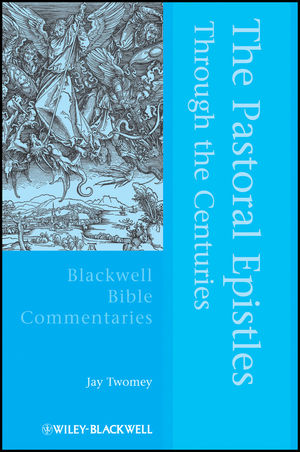The Pastoral Epistles Through the CenturiesISBN: 978-1-4051-2614-4
Hardcover
272 pages
December 2008, Wiley-Blackwell
 |
||||||
"This is a fine addition to the Blackwell Bible Commentary series . . . Twomey has given us an excellent commentary, lucid and elegantly written, further enriched by inclusion of interpreters from his own field of English literature: Chaucer, Charlotte Bronte, Thomas Hardy and Jeanette Winterson. " (Journal for the Study of the New Testament, 2011)
"Overall this is an excellent guide to the very significant and varied reception history of the Pastoral Epistles. The volume testifies to the role the Pastorals have had in shaping the church and at times wider culture too, and makes accessible in one volume the evidence for this highly significant role." (JTS, 9 April 2011)
"The Blackwell Bible Commentaries are a rare and valuable treasury of information, and Jay Twomey's volume on the Pastoral Epistles is a fine addition to this series. From Augustine, Aquinas, Calvin, and the Wesleys to Mary Astell, Amiri Baraka, Friedrich Nietzsche, and Jeanette Winterson (among a great many others), these biblical writings have been developed, transformed, and opposed in many ways and for many purposes. Twomey's survey further delineates the enduring power of the biblical canon to both stimulate and control "a steadily continuing history of complex and contradictory readings." George Aichele, Adrian College (retired)
“Jay Twomey straddles the fields of biblical studies and literary studies with enviable ease. He is familiar with the history of biblical interpretation, both critical and pre-critical, but that is only the beginning. In addition to the more usual ecclesiastical and theological suspects, he is able to adduce a wonderfully diverse range of literary authors, over several centuries, who cite the Pastoral Epistles or allude to them, which imparts a rare richness to his reception history.” Stephen D. Moore, Drew University
“A rich feast to suit every palate. Commentators from deep in
the past stand side by side with those who trouble the texts in the
present, especially feminist, queer and cultural counter-readings.
In Twomey's hands the Pastoral Epistles emerge as sites of tension
and struggle; in other words, they come to life and engage. A real
bonus is Twomey's ability to write well. It is a lucid, finely
written text that draws the reader in.” Roland Boer,
Monash University



